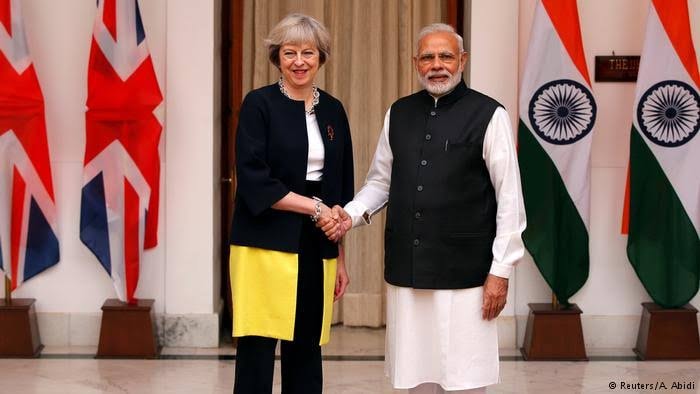
A Post - Brexit Britain & India Partnership can Unlock the Potential of the Commonwealth
Posted On Sat, Dec 01, 2018 by Dr Sachi Patel under International Strategic Studies Uncategorized

Written by Dr Sachi Patel
Presently the UK is engulfed in debates concerning Brexit, as Britain negotiates her departure from the EU, during this uncertain period, the Commonwealth has often been retrieved from the forgotten past to provide light and hope amidst the doom and gloom surrounding a post-Brexit Britain. Indeed, the renewed interest in the Commonwealth was exhibited in April this year during the Commonwealth Heads of Government meeting in London, spearheaded by the British royal family and the Prime minister. The Queen has been an advocate of the establishment since its inception and has been the head of the Commonwealth since 1952, and it was concluded that upon her retirement that her son, Prince Charles will succeed her and continue to carry the legacy of the Commonwealth forward. Her newly married grandson Prince Harry has also been appointed as Commonwealth Youth Ambassador to further reinforce the family's ties with the Commonwealth, carrying out his new role along with his new wife Meghan Markle.
The recent Commonwealth meetings provided an opportune moment to brandish a post-Brexit strategy, and flaunt an articulation of a new global Britain which pledges to put the Commonwealth at the heart of a Britain post-Brexit. In support of redirecting energies towards the Commonwealth, statistics have been brandished portraying the EU's economic problems which contrast the prospective ascendance of the Commonwealth. But let's be clear, for several decades Britain has conveyed no sincere interest in the Commonwealth, and Britain has merely operated as a nominal member. Britain's political elite had become increasingly reluctant to place significant importance in the Commonwealth as a vehicle to drive the UK's global policy. The elevation of the Commonwealth has of course been invoked by Britain's unforeseen withdrawal from the EU. Britain is being forced to reinvent its global role after Brexit, consequently the Commonwealth has emerged as an important facet of Britain's hopes in a post-Brexit world.
A symbol of the Commonwealth's deteriorating significance over the decades is the general dearth of knowledge concerning the functioning of the body. For instance, in 2010 the Royal Commonwealth Society conducted a poll on the Commonwealth, only a third of those surveyed could highlight any activity that the Commonwealth actually did, and most of those polled only named the Commonwealth Games. In respect to the significance of the Commonwealth, Britons ranked the Commonwealth below Europe and America. In general, the Commonwealth was least valued in Britain in comparison to all the other countries surveyed. Furthermore, only half of those polled were aware that the Queen was the head of the Commonwealth, indeed, 10% of South Africans and Indians assumed it was Kofi Annan, the former UN secretary-general, and 25% of Jamaicans thought it was Barack Obama.
The Commonwealth was configured in the 19th century in the wake of the British Empire crumbling, the Commonwealth became the forum for a new relationship with it previous colonies establishing all members as equal and inclusion no longer confined to those declaring allegiance to the British monarchy. Today, 53 countries are part of the Commonwealth, around 2.4 billion people, almost a third of the world's population. The countries range in size from India, with a population of more than 1.3 billion people, over half of the entire population in the Commonwealth, to tiny Pacific island states of Tuvalu with populations of just over 10,000. The UK was the largest economy in the Commonwealth until recent, having been surpassed by India. The Commonwealth is not an official trading bloc, nor are there overarching legally binding stipulations for the members of the body and nor are there any special immigration privileges. Instead, you have a loosely connected conglomerate of members, related by a common language, and similar legal and political systems.
Britain's renewed interest in the Commonwealth is positive for countries in the Commonwealth, especially India. India with the largest population and economy in the Commonwealth, along with the Britain will play a leading role in shaping the Commonwealth. Like Britain, India's renewed political interest in the Commonwealth is also evident by the participation of Prime Minister Narendra Modi in the 25th Commonwealth Heads of Government Meeting in London, marking the first Indian prime ministerial presence in a Commonwealth gathering after almost a decade. For India, the Commonwealth is the most natural forum to display it's standing as a truly global player. The venue provides India an opportunity to go beyond domestic politics and progress to be a significant global influencer on the world stage. Additionally, as Britain considers India as one of its leading economic partners in the world post-Brexit, Britain and India's common interest in the Commonwealth is expected to reinforce India-UK bilateral ties. Thus, for both India and Britain, resurrecting the Commonwealthwill be a vital joint endeavour enhancing the bilateral partnership as they both continue striving to exert themselves on the international stage.
However, for Britain and India to fully capitalize on this opportunity it has to tackle the Commonwealth's status which has for long been on the wane. Britain requires to reinvent the age-old Commonwealth with superpowers like India at its centre to enhance its global value. The Commonwealth also needs to be freed from its ties to a colonial legacy, an Empire 2.0 will not be welcome, there are many old wounds still intact from the days of the British empire which need to be avoided. Considering that for some Brexit is entrenched in imperial nostalgia such thinking will not be useful, indeed several Commonwealth countries are not reliant on Britain as a trade partner, and instead certain alliances are of greater interest for Britain than vice-versa, Britain needs to be alert to 3 this new reality facing them and not be seduced by delusions of Empire.
Another critical consideration is that much work needs to be done to establish the Commonwealth as a serious trading bloc, especially in a period where global forums are deemed redundant with the surge in protectionism. The UK currently exports nearly five times as much to the EU than to the Commonwealth. In 2015, approximately 44% of UK goods and services were traded with the EU. By contrast, the entire Commonwealth received around only 9% of UK exports. For Britain, the EU presents numerous benefits such as proximity which inevitably impacts trades, furthermore it's standing as a conglomerate of members with common laws and access requirements makes it an attractive trade body. Nevertheless, the Commonwealth is also an appealing prospect, for instance, during 2003-2013, trade in goods and services between Commonwealth countries expanded from $266 billion to $592 billion. That figure is expected to exceed $1 trillion by 2020. Furthermore, in 2013, the economy of the Commonwealth surpassed the EU's, and IMF forecasts suggest that by 2019 the Commonwealth will have passed the EU, contributing 17.7 per cent to global production compared to the EU's 15.3 per cent. Such predictions have prompted some to declare that Britain's future in a possible post-Brexit world, could be the Commonwealth, a forum which at its heart could also see the blossoming of a UK-India partnership. Consequently, leading countries such as India and Britain have an opportunity to revive and reimagine the Commonwealth, moulding the Commonwealth into a principal trading bloc. By forging an intimate partnership, India and Britain can cooperatively venture to unlock the potential of the Commonwealth. A post-Brexit Britain and a quickly globalising India must not succumb to short-sighted obstacles to this alliance, and instead rapidly realise the mutual benefits of this partnership with the Commonwealth as the centre-piece.
Recent Articles
- Models of Public Service Delivery for the Homeless in India: A Comparative Analysis and an Agenda for the Future
- Discussion with H.E. Ambassador Christoph Heusgen
- Round Table Discussion with H.E. Ms. Louise Blais
- China-Iran Deal: A Checkmate to India
- Chinese Belligerence Increases the Number of People Identifying as Taiwanese
- Interview with Sylvia Mishra on India's Defense Relations with Major Powers in the Post- COVID-19 World
- Peering into the future - Economy, Society amd World Politics after COVID-19
- Humanity better off with world order without ‘Chinese characteristics’
- Military Recruitment in the U.S., China, and Russia
- A Comparative Analysis of Key Structures & Responses to the Syrian Refugee Crisis in Germany, Turkey, and the United States
- Analysing the Abrogation of Article 370
- Rethinking India’s Strategic Choices for National Security
- Global Policycast: Geopolitics and Economic changes in Ukraine & Eastern Europe, Christina Pushaw (expert on Eastern European Affairs) in conversation with Arpit Chaturvedi (CEO, Global Policy Insights)
- Syria in ruins as war enters 9th year
- Lord Howell of Guildford’s key note speech at Global policy insight’s seminar on Post Brexit World: UK and the Commonwealth
- A Post - Brexit Britain & India Partnership can Unlock the Potential of the Commonwealth
- Lessons from the Great War : Inevitability versus Institutions
- UK-India Trade Relations: The Long Road Ahead

